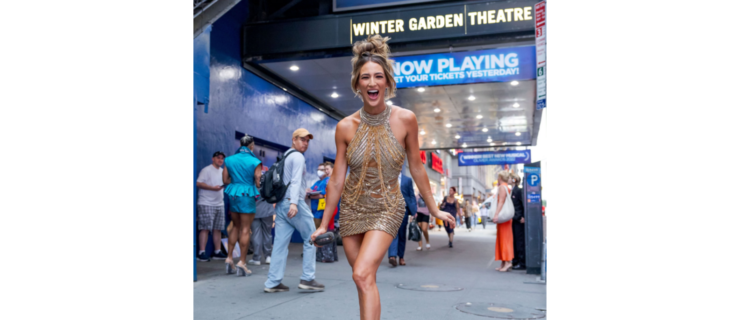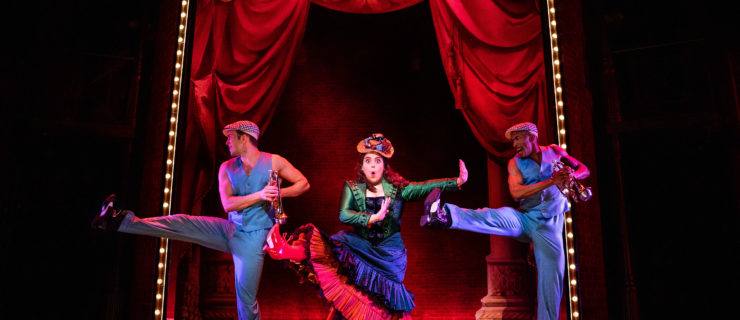Meredith Aleigha Wells Is Breaking Boundaries This Holiday Season
Chicago-based dancer, actor, singer and writer Meredith Aleigha Wells dreamed of a career in the arts from a young age, and landed at the University of Massachusetts, Amherst, to pursue that dream. It was there, however, that Wells (who uses they/them pronouns) was diagnosed with postural orthostatic tachycardia syndrome (POTS,) a form of autonomic dysfunction, which ultimately required them to use a wheelchair. While a debilitating illness could have forced Wells to give up their performance aspirations entirely, instead, they say their disabilities have reinvigorated their craft and forced them to reflect on why they want a career in the performing arts in the first place. After graduation, Wells went on to perform in festivals all over the world, and even created their own one-person musical, Dysfunctioning Just Fine.
This month, Wells set out to conquer even more uncharted territory as the first performer in a wheelchair to embark on a national tour: Dr. Seuss’ How the Grinch Stole Christmas! The Musical. The production just wrapped up performances after playing in Paducah, KY, Charlotte, NC, Washington, DC, and Atlanta, GA.
Dance Spirit
spoke to Wells on the challenges and opportunities they’ve encountered on tour.
Dance Spirit: What are some ways that having a disability affects your life as a performer?
Meredith Aleigha Wells:
Being disabled affects every aspect of my life, including performing. When auditioning, I have to consider things like accessibility of venues, climates of outdoor venues, and what disability accommodations I need if I book the job.
When I learn choreography I have to work double-duty and wear both my “dancer hat” and my “choreographer/master-movement-translator hat” to be able to immediately translate what’s taught to a seated position. I call it “translating” because it’s similar to being bilingual. I have a set of vocabulary in my seated-movement language, and I know what each step of mine translates to in traditional ballet and jazz terminology.
Once I’m in the theater, my costumes tend to have to be modified, and my dressing rooms are on stage level. What I found particularly challenging on tour is that each theater is different. Some theaters have inaccessible crossovers, so my show blocking, mainly my exits and entrances, change slightly from venue to venue, depending on what side of the stage my dressing room is on.
DS: How did you book the Grinch tour?
Wells:
Before booking The Grinch, I was in sort of a rut, always feeling like I was sending in solid material, getting really close, and ultimately not booking. It had happened so many times this past year that I started to question whether or not national tours were logistically possible for someone in a wheelchair, since many touring houses are not accessible. I was one rejection away from putting the pause button on national tour auditions when I booked this show.
I auditioned solely through self-tapes. An initial submission of interest in auditioning on Actors Access led to a request from the casting directors to prepare the Who Kid packet of materials, which included a song-and-dance combination from the show, as well as an acrobatics tape. I was told a few weeks later that everyone loved my tapes, and they wanted to explore and play around with some options. I was then asked to prepare the Grandma Who materials. Submitting for two vastly different characters was really fun, and a few weeks later, I received an email with the offer to join the tour as Punky Who!
DS: What were you most nervous about coming into this experience?
Wells:
Before landing in Paducah, KY, for rehearsals, I was most nervous about bringing my service dog, Scout, on tour. Because theaters have been closed for the past 18-plus months, Scout had never accompanied me at rehearsal or backstage. Thankfully, our producers, my fellow castmates and our creative staff have all been so supportive and patient as we navigate this new territory as a team.
DS: What challenges have you had to work through on tour?
Wells:
The biggest challenge for me about touring is the constant shift in routine. There are parts on a more macro level that stay relatively the same (shows around the same time at night, three-show-days on Saturdays, etc.), but then with each city change there are micro parts of your routine that are constantly changing, such as unfamiliar grocery stores in each region, different hours for nearby food, new gym equipment, laundry situations and more. A lot of my chronic illness management thrives on routine, so finding ways to give myself routine without depriving myself of exploring and enjoying each new city has been a new and exciting challenge.
One other challenge I’ve faced is that with all the flying I’m doing, a few parts of my chair have been broken by various airlines. It’s not surprising, considering on average, 28 wheelchairs are broken or damaged per day by airlines, but it’s frustrating and time consuming to have to file a report at baggage claim and feel like I keep the group waiting. My cast is thankfully really understanding, and I have fortunately only had minor damage to my chair that hasn’t affected my ability to perform.
DS: What accommodations have helped you the most on tour?
Wells:
Having two crates for my service dog so I don’t have to lug a crate each day between the hotel and the theater has been a game changer. One lives in my hotel room, and the other lives in my dressing room and is transported with the set. My costumes’ socks are compression socks, which has been great for minimizing my cognitive dysfunction. And it might seem like a no-brainer, but all the hotels and theaters being wheelchair-accessible. That’s actually not something I’m used to.
DS: What moments stood out most to you on tour?
Wells:
Maybe this is cliché, but stepping out on opening night and performing this show for the first time. It was a moment I was never sure I’d get to experience.
DS: What lesson will you take away from this tour?
Wells:
When you feel like you’re running out of time, slow down. I didn’t book this show overnight. I didn’t get lucky. I dedicated half a lifetime to a dream and stayed consistent every day until that dream was a reality. Stay patient.
DS: What do you hope other performers with disabilities will learn from your example?
Wells:
Sometimes the path isn’t going to be paved for you. It can be lonely sometimes, but keep showing up anyway. Set the precedent. Keep taking up space. Keep putting disability and access on their radar. My work is always dedicated to the underdogs; the strong, resilient humans who are breaking down stereotypes and exceeding expectations every day!



